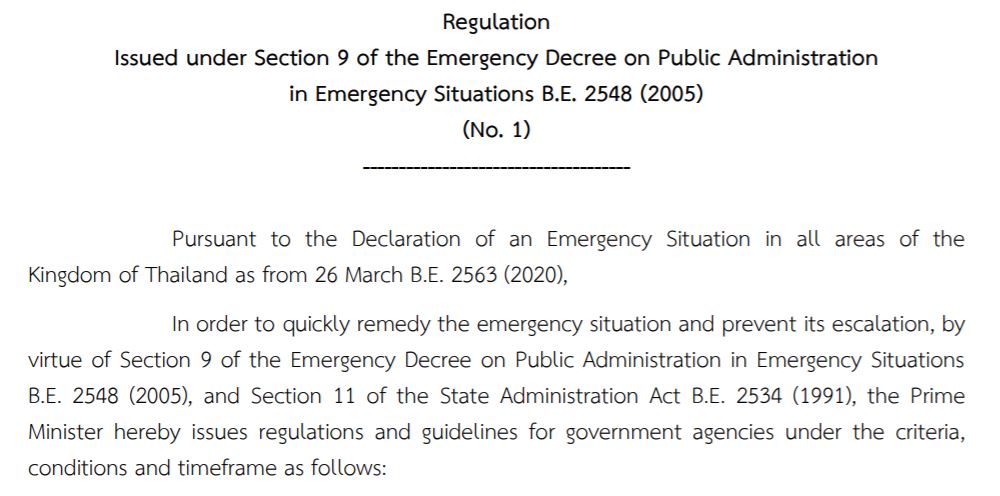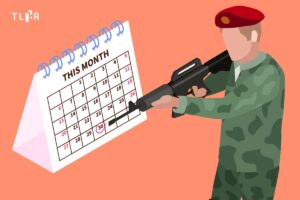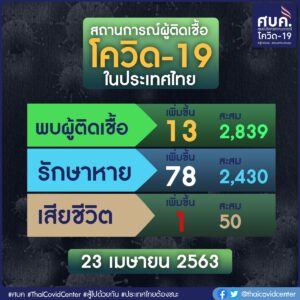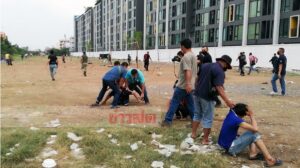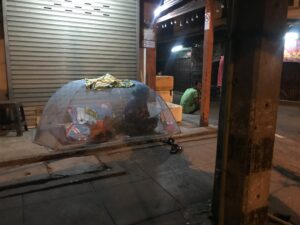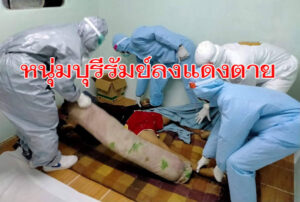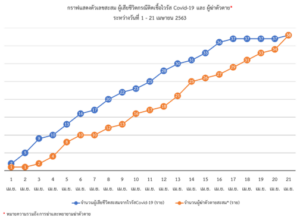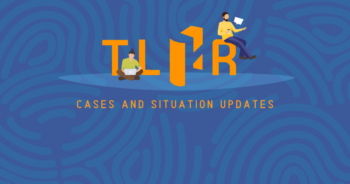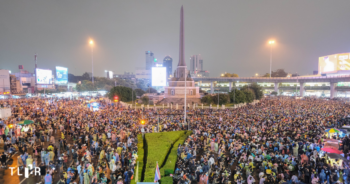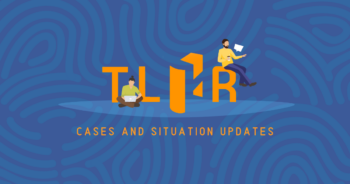It has been one month since the government has enforced the Emergency Decree on Public Administration in Emergency Situations B.E. 2548 (2005) or “Emergency Decree” nationwide from 26 March 2020 to 30 April 2020. Before the decree expires, the government decided to extend its enforcement for another month and prepared to relax some restrictions imposed earlier to fight the spread of COVID-19 in May.
Previously, opposition parties jointly proposed that the government revoke the nationwide enforcement of the Emergency Decree, which was due to expire on 30 April. According to them, the existing public health measures were already sufficiently effective in combatting the COVID-19 pandemic. Therefore, the extension of the Emergency Decree would be unnecessary. As an alternative, the government could use relevant public health laws and convene a meeting within the House of Representatives to seek solutions through parliamentary processes and provide a platform for ordinary citizens to voice out on related issues through their MP representatives.
Thai Lawyers for Human Rights (TLHR) has previously raised concerns regarding the Emergency Decree since it was initially enforced nationwide. Assessing the government’s implementation of the decree and its ensuing socio-economic consequences over the past month, TLHR has identified the five following reasons why the government should not extend the Emergency Decree:
1. The intensity of COVID-19 outbreak has dropped to the level that is controllable under ordinary laws
Declaring the State of Emergency entails the enforcement of the Emergency Decree, which limits the rights and freedom of the people in many facets of their lives, including their freedom of association, freedom of the press, and freedom of movement. The decree, furthermore, grants sweeping powers to the authorities and limits the possibility of judicial oversight on such powers. In principle, the enforcement of this special legislation must be limited in duration and strictly proportionate to the specific emergency that is being handled. The necessity of the State of Emergency must be regularly reviewed. If the emergency which initially prompted the enforcement of the Emergency Decree has ended or calmed down, the State of Emergency should be revoked.
The Center for COVID-19 Situation Administration (CCSA) reported only 13 confirmed new COVID-19 cases on 23 April 2020. The total number of infected persons stood at 2,839, whereas the cumulative death toll at 50. Additionally, 2,430 persons have fully recovered. This record marks the lowest number of new cases in a month and indicates a significant drop in the intensity of the COVID-19 outbreak in Thailand.
The decline of the outbreak, together with the negative impacts of the decree enforcement on people’s lives, invited us to think about the diminishing necessity of the Emergency Decree. The one-month State of Emergency has adequately controlled the outbreak of the virus. The government can now resort to other laws, such as the 2015 Communicable Diseases Act, to undertake measures for preventing further transmission of the pandemic, including raising public awareness about disease prevention, facilitating people’s transition to normal life, and restoring the country’s economy immediately.
Picture of COVID-19 cases as of 23 April, CCSA
2. The authorities often interpret their powers under the Emergency Decree too broadly. Their exercises of power do not serve the purpose of controlling the pandemic and aggravate the socioeconomic impacts on the population
One of the concerns TLHR has raised in the previous article was about Article 5 of Regulation No.1 issued under Section 9 of the Emergency Decree which “to assemble, to carry out activities, or to gather at any place that is crowded, or to commit any act which may cause unrest.” TLHR has pointed out that the absence of a concrete definition for the term “activities” in Section 9 could leave room for the authorities to interpret it too broadly and arbitrarily criminalize certain activities beyond necessity.
The government has been imposing its emergency powers to suppress violators of the Emergency Decree and control the pandemic outbreak without taking into account how its measures will impact people’s lives. After the Emergency Decree was enforced, several people have lost their employment and household income, whereas others have lost their housing because they could not afford the rent. Most of them do not have access to the government’s aid programs, which are vital for their survival. As a result, other people in the society had to organize private humanitarian initiatives and activities to distribute money and food to those suffering from this economic hardship.
Not only is the state aid program inaccessible for several people, but law enforcement officers have also used the laws to threaten people who distribute food to others in need. Some officers interpreted food distribution as “activities” illegal under the Emergency Decree, which prohibits carrying out activities or commit any act which may cause unrest. Reportedly, many people have been charged and tried in court for such activities.
The government’s approach to enforcing the Emergency Decree, therefore, has worsened the severity of the economic impacts on the people and does not serve the intended purpose of preventing the pandemic outbreak. State officials could have resorted to other measures to alleviate the hardship by facilitating food distribution and ensure hygiene in accordance with the government’s public health guidelines. However, in reality, they have counterproductively placed restrictions that require people who wish to distribute food to request official permission from their local administrative office. On the one hand, this regulation might help foster partnership between state officials and private donors and allow for the state to support or collaborate with private initiatives. Still, arguably, it also creates an additional burden for people who wished to help others during this difficult time.
Reportedly, there was also an incident in which state officials confiscated the food, which was intended to be distributed for free even though the law does not grant them any powers to do so. Some cases, for example, the arrest of migrant workers who were playing sports, led to unrest and exposed concerned persons to even more risks of infection.
The Emergency Decree has also been used to threaten some people to discourage them from demanding solutions to the current crisis. For instance, a group of Chiang Mai University students attempted to submit a letter to their university council, requesting a tuition reduction. However, some police officers reportedly informed them that the act of handing the letter would constitute a violation of the Emergency Decree.
Picture of arresting of migrant workers, Khaosod news
3. The imposition of curfew increases the vulnerability of marginalized groups
After the declaration of the State of Emergency, the government has issued Regulation No.2 on its curfew measures which ban all people from leaving their home from 22:00 – 04:00 hrs. Notably, the Regulation grants some groups an exemption from the curfew. The Regulation has taken effect since 3 April 2020. The failure to comply with this Regulation will result in two years imprisonment, a fine up to 40,000 THB, or both. The government did not publicly clarify how the six-hour, night-time curfew order can curb the spread of the COVID-19 pandemic, which can happen at any time.
Later, Dr. Taweesilp Visanuyothin, spokesman of the Centre for COVID-19 Situation Administration (CCSA), reported that during 3 and 23 April, 16,179 persons violated the curfew order by leaving their homes without adequate reasons. 2,983 persons out of this number were issued a warning while the other 13,196 have been charged. For those who violated the decree by gathering, attending a public assembly, or committing any activities that may cause unrest, 1,835 persons were issued a warning, whereas 1,730 were charged.
According to the information received, several people who were subject to strict curfew-related law enforcement belong to vulnerable social groups, including the homeless and daily workers. For example, two homeless people in Chiang Mai Province have been arrested and charged for violating the curfew by allegedly leaving their “home” after 22:00 hrs. The Court, subsequently, found both of them guilty. In another case, 15 construction workers were arrested by police officers for violating the curfew as they were making their way home. Reportedly, they had to pour concrete, which was the work that must be done all at once, thus requiring them to work overtime. The authorities proceeded with the arrest, although the workers had presented them with the special travel permit issued by their company. Furthermore, a fisherman and an emergency vehicle driver were arrested in Songkhla Province while they were performing their jobs even if the Regulation issued under the Emergency Decree exempts people in these professional sectors from the curfew.
Picture of homeless peoples in Chiang Mai, TLHR
4. Some measures are not appropriate for or proportionate to the purpose of reducing the rate of transmission
The government has implemented many measures to prevent the spread of COVID-19 pandemic. However, the public remains skeptical about whether some specific policies could effectively reduce the rate of transmission.
For instance, the government has imposed a nationwide ban on alcohol sales. According to CCSA spokesman Dr. Tasweesilp Visanuyothin stated that this measure was put in place to “prevent drinking during the Songkran festival and the ‘Seven Days of Danger.’ He added that the government normally campaigned to discourage people from drinking alcoholic beverages during this period and, therefore, would take advantage of this measure during the current emergency situation. Nevertheless, the government could have taken a better preventive measure by banning a gathering which features the drinking of alcoholic beverages. Such a step would be more reasonable, necessary, and proportionate as a much-needed response to the COVID-19 outbreak. Moreover, it would not aggravate the impacts on small retailers who are already suffering from the current economic downturn.
Another matter which triggered a heated debate among legal experts was the order requiring people going outdoors always to wear a face mask. The experts questioned whether such an exercise of power is lawful, prompting the president of the Supreme Court to convene a meeting on this issue. The meeting concluded that all provincial governors have the authority to prohibit any person from leaving their homes without a face mask. However, if a person violates the prohibition, the adjudicator must exercise careful judgment by taking into account the nature of the accusation and the committed offense, as well as the accused’s socioeconomic background.
These measures reflect the government’s arbitrary exercises of power. Their responses to the COVID-19 crisis stemmed solely from the perspective of state officials and failed to engage the affected people in decision-making processes. Ironically, it is the people who have had to suffer from these inconsiderate measures. Despite the hardships these measures have caused, the people continue to follow them in hopes that they would bring an end to the pandemic outbreak. Under such a circumstance, both the government and operational state officers should pursue other measures that could address the issue more proportionately and appropriately.
Picture from Manager Online
5. Emergency measures that fail to consider ensuing economic impacts can kill people as much as COVID-19 infection.
The government has not considered the potential economic impacts resulting from its strict enforcement of the Emergency Decree in its design of the official response to the COVID-19 outbreak. It fails to recognize ordinary people’s grievances and ignores the real purpose of enforcing the law, which was to curb the outbreak. The impoverished and other vulnerable groups are finding themselves facing an impossible economic hardship, so many of them decided to commit suicide. The research study “Changing Lives of the Urban Poor in the Changing Urban Society” stated,
“According to the data gathered from 1 to 21 April 2020, there were 38 reported cases of suicide, which could be linked to the government’s policies and measures related to COVID-19. By comparison, the same number of people- 38 – died from COVID-19 infection during the same period.
Drawing on the data mentioned above, we notice that the groups that have been most affected by the government’s policies and measures are employees and independent workers, especially the urban poor who have been forced into unemployment yet do not have access to state remedies. Small retailers also severely suffer from these policies and measures.
Furthermore, most people who committed suicide were at working age and played an essential role in providing for their families. Therefore, when they became suddenly unemployed, they had to face unbearable pressures upon themselves and their families.”
During the outbreak of the COVID-19 pandemic, the consequent socioeconomic crisis is not any less important than the public health crisis because both of them impact people’s daily lives. The strict enforcement of the Emergency Decree and other measures without any relief measures on the economic impacts, thus, will likely deteriorate the emergency situation.
A diagram of commit suicide cases, The research study “Changing Lives of the Urban Poor in the Changing Urban Society”
TLHR acknowledges the challenges and complexity which Thailand and other countries around the world are facing in dealing with the outbreak of the COVID-19 pandemic. We believe that the government has enforced the Emergency Decree on Public Administration in Emergency Situations B.E. 2548 (2005) with the clear purpose of controlling the outbreak. Accordingly, the enforcement of the decree should only be a temporary measure to address this sole purpose. As the emergency situation of the COVID-19 outbreak has calmed down, the government could alternatively use ordinary laws in preventing the outbreak in the future. Therefore, not extending the Emergency Decree will allow the government to resolve the current socio-economic crisis in tandem with the public health crisis effectively.
